By Ashley Craven
It doesn't happen overnight - it kind of sneaks up on you without you even realizing. I was about 15 when it began and at first it was gradual - the constant hiding behind baggy clothing, not wanting to wear a bathing suit or anything that made me remotely feel like anybody could see my body. Then the obsessions began of feeling as though I was never good enough and just never feeling content with how I looked or who I was.

High school was hard to adjust to because it felt like a whole new world with people much older than me, and it also was when my feelings of not being enough heightened. Social media started becoming a big deal when I turned 16, particularly when Instagram was launched. Social media took over everyone’s phones, and it certainly took over my thoughts. I became obsessive with how models looked - comparing myself, craving those unachievable, often photo-shopped looks and focusing on all my perceived flaws. The constant thoughts living in my head of not feeling like I was good enough escalated even further. The thoughts started turning into actions, which affected my life immensely. Even though I played competitive softball, I was barely able to keep up anymore because I was weak and didn’t have as much energy as I used to. At the time everybody just thought I was anemic – not getting enough protein in my diet - however, little did they know, I was just hurting my body.
Another year passed, 17 came and things got worse. I started suffering from depression after losing one of the things I loved the most - softball. Not only did I have to give up softball but I also had to quit my job, because I could not keep up with the demands of work. I was losing all these things that brought me joy but for some reason this didn't stop my eating disorder, even as I turned 18 and entered into a new phase of my life – university. Although I started playing softball again and I was happier because of that, my teammates kept commenting on my appearance out of concern for my well being, but I never listened. Despite desperately trying to maintain my eating disorder, I finally ended up in the hospital to seek help. It was a hard year – it was a difficult battle to give up those constant thoughts, the nagging obsessions, and the eating disorder that I had come to know so well. Trying to walk away from something that had consumed my mind for 4 years was no easy feat and it certainly didn’t happen over night. My motivation to make the most of university, a place I have always wanted to be, pushed me to starting changing my ways because I knew I had to get better in order to continue studying.
 At 19, I thought the word recovery meant fully healed. But what did fully healed really mean? It wasn’t until I was 20 that I realized what recovery truly meant for me. It meant working towards small goals each day, and not letting the one thing that used to consume my mind, continue to do so. It was in celebrating the little steps in my progress that I started to feel better. My recovery took time – it was a slow and meaningful battle – but I owned it and I fought hard. I was able to beat my eating disorder because of my desire to get better and because of the amazing support system that stuck by my side throughout the whole journey. My best friend, who was always patient with me, was able to recognize when I was falling back into my old ways. My family, who surrounded me with constant love, were able to open my eyes to new pathways in life. I am grateful for all of my loved ones who took the time to listen, led me onto the right path, and helped me celebrate the little wins each day that ultimately led to my recovery. All of these people were part of my success story. Here I am at 21 and I can genuinely say I am happy, healthy and stronger than ever.
At 19, I thought the word recovery meant fully healed. But what did fully healed really mean? It wasn’t until I was 20 that I realized what recovery truly meant for me. It meant working towards small goals each day, and not letting the one thing that used to consume my mind, continue to do so. It was in celebrating the little steps in my progress that I started to feel better. My recovery took time – it was a slow and meaningful battle – but I owned it and I fought hard. I was able to beat my eating disorder because of my desire to get better and because of the amazing support system that stuck by my side throughout the whole journey. My best friend, who was always patient with me, was able to recognize when I was falling back into my old ways. My family, who surrounded me with constant love, were able to open my eyes to new pathways in life. I am grateful for all of my loved ones who took the time to listen, led me onto the right path, and helped me celebrate the little wins each day that ultimately led to my recovery. All of these people were part of my success story. Here I am at 21 and I can genuinely say I am happy, healthy and stronger than ever.
For anyone struggling with an eating disorder, I am letting you know that things do get better and easier. Hold onto your support system, and appreciate the help and guidance they give you. Celebrate the daily victories because it means you are on the right path. And most of all believe in yourself throughout your journey, because recovery is possible.

Ashley Craven is currently studying psychiatric nursing and regularly spends time working on ways to make positive changes in the mental health community. Her motivation and passion to help others come from her own eating disorder recovery. She is excited to be more involved in the Looking Glass Foundation programs.
By Paige Freeborn
“You yourself, as much as anybody in the entire universe, deserve your love and affection.”
~ Buddha
Meditation teacher Sharon Salzburg defines compassion as the quivering of the heart in response to pain or suffering. Often, we have no problem extending our compassion to another person; making a nutritious meal for loved ones, offering a smile to a stranger, or creating space for someone else’s suffering can bring us a heightened sense of purpose, belonging, and connection. Sometimes, however, it can feel uncomfortable extending this same compassion to ourselves. For some, the very thought of self-compassion can seem pointless, weak or selfish; however, nothing could be further from the truth.
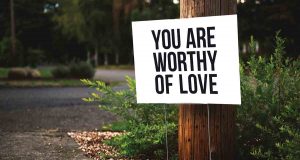 Self-compassion brings us into a sense of wholeness. It teaches us to come into a different relationship with ourselves when we are suffering or in pain. As we engage with self-compassion practices, we learn to love all parts of our human experience, even those we consider imperfect. We stop accepting responsibility for that which we have no control over, and the comparing mind quietens down. We come into a new relationship with anxiety that is grounded in tenderness and curiosity. Learning to see ourselves as worthy of love gives us the strength we need to be able to weather life’s inevitable storms. Just as we have the ability to recognize when others are suffering, and just as we are called into action to support them, so too do we begin to recognize our own moments of suffering, and take the necessary actions to care for ourselves.
Self-compassion brings us into a sense of wholeness. It teaches us to come into a different relationship with ourselves when we are suffering or in pain. As we engage with self-compassion practices, we learn to love all parts of our human experience, even those we consider imperfect. We stop accepting responsibility for that which we have no control over, and the comparing mind quietens down. We come into a new relationship with anxiety that is grounded in tenderness and curiosity. Learning to see ourselves as worthy of love gives us the strength we need to be able to weather life’s inevitable storms. Just as we have the ability to recognize when others are suffering, and just as we are called into action to support them, so too do we begin to recognize our own moments of suffering, and take the necessary actions to care for ourselves.
When we are in our eating disorder, we try to deny a critical aspect of our human experience, and often don’t feel deserving of care and attention. One of the gifts of recovery is learning to prioritize our own health and wellbeing. Taking care of our own well-being requires conscious effort, and as we recover, we learn to reclaim our life and come into a different relationship with our own suffering. We learn to hold our suffering with care, and become tender with ourselves, especially when we are hurting. Once recovered, we are standing on a foundation of new skills, perspectives, and insights. These are the rewards of overcoming something as monstrous - and as monstrously misunderstood - as an eating disorder.
 Eating disorder sufferers can be relentless in their self-punishment, and deem themselves profoundly unworthy of care. In order to heal, we must learn to embrace all aspects of our existence, and this means coming into a loving relationship with the parts of our lives that feel difficult, messy or ‘out of control.’ A profound shift happens when we meet our difficulties with a caring presence, rather than turning to the eating disordered behaviours to help us cope. We learn that something inherently trustworthy can replace the eating disorder, and that choosing the path of self-care is more wonderful than we ever could have imagined. At first, this takes a leap of the imagination. Like an artist creating a masterpiece, we must first imagine what that masterpiece might look like. Then, we begin employing the skills needed to be able to realize our vision. All artistic processes involve setting intentions, practicing, making mistakes, and learning to enjoy the process along the way. Failures and unforeseen outcomes are all a part of the learning process, and often surprise us in their ability to turn us in a new direction - one that is even more exquisite than we could have imagined. In order for us to come into a comforting relationship with ourselves, we must learn to practice the art of self-care.
Eating disorder sufferers can be relentless in their self-punishment, and deem themselves profoundly unworthy of care. In order to heal, we must learn to embrace all aspects of our existence, and this means coming into a loving relationship with the parts of our lives that feel difficult, messy or ‘out of control.’ A profound shift happens when we meet our difficulties with a caring presence, rather than turning to the eating disordered behaviours to help us cope. We learn that something inherently trustworthy can replace the eating disorder, and that choosing the path of self-care is more wonderful than we ever could have imagined. At first, this takes a leap of the imagination. Like an artist creating a masterpiece, we must first imagine what that masterpiece might look like. Then, we begin employing the skills needed to be able to realize our vision. All artistic processes involve setting intentions, practicing, making mistakes, and learning to enjoy the process along the way. Failures and unforeseen outcomes are all a part of the learning process, and often surprise us in their ability to turn us in a new direction - one that is even more exquisite than we could have imagined. In order for us to come into a comforting relationship with ourselves, we must learn to practice the art of self-care.
While on the one hand our human struggles are universal in nature, there are differences between cultures when it comes to self-care routines. In collectivist cultures, the interconnectedness of people is the primary orientation for identity formation. When one person celebrates, the whole community celebrates, and when one person mourns, everyone mourns along with them. Celebration and mourning ceremonies are highly ritualized, and people know where they can turn when they are suffering. Isolation and loneliness are lessened when the community comes together in solidarity, and connects with rituals that have brought their people comfort through the ages. Modern examples include communal bathing rituals, contemplative practices or taking special food and beverages together on a daily basis. The concept of “self-care” is a relatively recent phenomenon in North America, with an interesting history, and it is wonderful to see many workplaces and organizations now recognizing the need for individual self-care as a response to the well-documented effects of long-term stress. Some European countries are in the process of enacting laws to protect their citizens’ right to disconnect from technology, so that they can pursue more relaxation time outside of work. For those of us raised in an individualistic society, the art of self-care can take more thought and practice; however, through trial and error, we can learn to identify our needs and self-advocate. Here are some self-care lessons I have learned along the way:
You don’t need to earn it. We don’t need to exhaust ourselves or do anything “exceptional” before engaging in self-care. We are already deserving of love, care, and attention by virtue of the fact that we are human. Using self-care as a preventative measure - a response to daily stress - is one of the wisest pursuits we can invest in. By learning to support ourselves, we gain strength and resilience, and are in a better position to be able to support others.
Authenticity. There are as many ways to engage in self-care as there are people on the planet, and what works for one person might not work for another. Every day, we are bombarded by information and images that showcase the lifestyles of others, and it can sometimes be difficult to decipher what we ourselves need in any given moment. As we practice, we become more finely attuned to what works for us. It is important to pay attention to how we feel as we engage in our self-care rituals, so that we can learn to trust our deepest and truest instincts, and learn to advocate for ourselves when we need support.
 Mindful ritual. Knowing when we are engaging in self-care routines, and creating intentionality around our actions is critical. Habits imply repeated, mindless actions, while resolutions have a hard and unforgiving quality. Intentions, on the other hand, allow us to mindfully choose what we would like to give our attention to, and to engage in a series of actions with the purpose of enjoying the process. Self-care rituals are loving, symbolic gestures that allow us to be fully present without attaching to any particular outcome. They help ease the stress of the human condition, and can give us a profound sense of comfort and belonging. Almost anything can be considered a mindful ritual if we orient to it in a way that is healing and nourishing. This includes the simple act of walking, sipping a cup of tea, or snuggling into bed for a nap.
Mindful ritual. Knowing when we are engaging in self-care routines, and creating intentionality around our actions is critical. Habits imply repeated, mindless actions, while resolutions have a hard and unforgiving quality. Intentions, on the other hand, allow us to mindfully choose what we would like to give our attention to, and to engage in a series of actions with the purpose of enjoying the process. Self-care rituals are loving, symbolic gestures that allow us to be fully present without attaching to any particular outcome. They help ease the stress of the human condition, and can give us a profound sense of comfort and belonging. Almost anything can be considered a mindful ritual if we orient to it in a way that is healing and nourishing. This includes the simple act of walking, sipping a cup of tea, or snuggling into bed for a nap.
Loving-kindness meditation. Thanks to many wise modern meditation teachers, the concept of “lovingkindness” is entering our culture in significant ways. There are loving-kindness (“Metta”) meditations online, and many meditation retreats devote time to this ancient tradition. For some, at first, it can be difficult to connect with this type of meditation. For others, it is like landing upon something they have been searching for their whole life. Research shows that making this a regular part of our practice can help rebuild our brain’s gray matter, and orient us towards a calmer, more peaceful, balanced life.
Connecting with nature. Human beings are transformed when they are out in nature. The Japanese art of “forest bathing” (shinrin-yoku) has gained international attention, and highlights the importance of creating the space for intentional time in nature. This is not a time for goal setting and achievements, but rather a time to experience nature through our senses: smells, sights, sounds, tastes, and touch.
The compassionate “no.” As we tune into our own needs, we come to the realization that they do not always align with those of others; and therefore, self-care requires clear communication and compassionate boundary setting, so that we can create the space we need to rejuvenate. Learning to advocate for our own wellbeing means we won’t always please everyone; however, we can learn to advocate for ourselves in ways that allow everyone to retain their dignity.
As we develop self-care routines, we learn to create a life of caring attention. Through experience, we come to understand that taking care of ourselves is not optional, but a necessary part of living a fully engaged life. As with all art forms, the practice of self-care opens our heart and mind to new and hopeful possibilities, makes us more observant, and reignites our imagination. As we learn and grow, we gain a more expansive view of life, and understand that it has the potential to be filled with more beauty, purpose, peace, and presence.
 Paige Freeborn is an artist, educator, meditation and yoga teacher, and sociocultural leader who recovered from an eating disorder over twenty years ago. She regularly works with teenagers and adults, helping them develop more self-compassion, as well as the confidence they will need to be able to be a support for others. Over the years, Paige has oriented much of her life around service. She is looking forward to becoming involved with the Looking Glass Foundation’s Hand In Hand Program.
Paige Freeborn is an artist, educator, meditation and yoga teacher, and sociocultural leader who recovered from an eating disorder over twenty years ago. She regularly works with teenagers and adults, helping them develop more self-compassion, as well as the confidence they will need to be able to be a support for others. Over the years, Paige has oriented much of her life around service. She is looking forward to becoming involved with the Looking Glass Foundation’s Hand In Hand Program.
By Kaela Scott
Q: I know that part of recovery is learning to normalize eating food but this feels really tough. Any suggestions on how to make it easier?
A: In my eating disorder counselling practice, I get asked multiple times a week about whether or not it is safe to eat certain foods. Clients will send messages with their dinner plans and ask if it is okay for them to eat that food or if what they are eating is too much. While I am of course here to provide support, I also think it is important to realize that one of the main jobs of recovery is to say yes to pretty much every food opportunity and option that comes your way and to train yourself to realize that food isn't what hurts you.
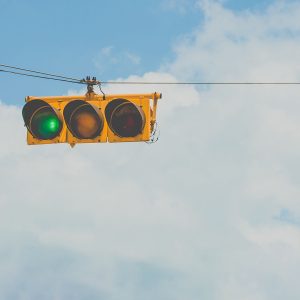 In recovery, very little is actually about food, but on the flip side, each person needs to develop a healthy relationship with nourishing their bodies and supplying their body with the food it requires to live a positive, energetic life. The disorder, when in control, places endless restrictions on what is allowed vs what isn't and what is safe vs. unsafe. These rules, generally, have nothing to do with nutrition (a registered dietician would almost never make those recommendations) and everything to do with the abusive role the disorder plays. While I understand that some people may have some preferences, for example not loving meat, overall one of your jobs in recovery is to recognize that the problem lies with the disordered rules, not the food itself. While it is really hard to practice saying yes after saying no to so many things for so long, I genuinely believe it is one of the best pushes you can give yourself. Not only will it help with normalized eating, but it will also decrease how long the disorder still gets to have say in your life.
In recovery, very little is actually about food, but on the flip side, each person needs to develop a healthy relationship with nourishing their bodies and supplying their body with the food it requires to live a positive, energetic life. The disorder, when in control, places endless restrictions on what is allowed vs what isn't and what is safe vs. unsafe. These rules, generally, have nothing to do with nutrition (a registered dietician would almost never make those recommendations) and everything to do with the abusive role the disorder plays. While I understand that some people may have some preferences, for example not loving meat, overall one of your jobs in recovery is to recognize that the problem lies with the disordered rules, not the food itself. While it is really hard to practice saying yes after saying no to so many things for so long, I genuinely believe it is one of the best pushes you can give yourself. Not only will it help with normalized eating, but it will also decrease how long the disorder still gets to have say in your life.
If you choose to move forward in this way, I would encourage you to give yourself a pep talk to acknowledge that while this will make you anxious, the anxiety is only there because the disorder is there. Individuals who have healthy relationships with themselves and their bodies don’t get anxious about eating certain food groups, eating regularly, going out to dinner etc. As with most things recovery related, we want to remind ourselves that the disorder is the problem, not our healthy goals. Try to remind yourself that there is no expectation that normalized eating feel “normal” or safe for you to begin with. We all understand how hard and challenging taking these steps can be so be sure to show yourself compassion for challenging the ingrained thought processes of the disorder.
So with that, try to practice saying yes a little bit more this week. Be brave. My promise to you is that there is absolutely no food (with the exception of legitimate allergies) that will be even remotely as toxic and detrimental to your system and health as your disorder will be. I assure you, nothing will be different about you tomorrow except for the fact that you just moved yourself closer to the freedom you are really seeking.
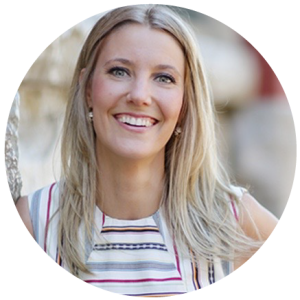 Kaela Scott is a Registered Clinical Counsellor who specializes in Eating Disorders. She runs her own private practice and works with the Looking Glass Foundation in both their summer camp and their Hand In Hand Program. She has been passionate about working with eating disorders since freeing herself from her own struggle and realizing what it is like to be happy and well. When she isn’t working, you can find Kaela either cozying up with a cup of tea and her friends or up in the mountains going for a hike.
Kaela Scott is a Registered Clinical Counsellor who specializes in Eating Disorders. She runs her own private practice and works with the Looking Glass Foundation in both their summer camp and their Hand In Hand Program. She has been passionate about working with eating disorders since freeing herself from her own struggle and realizing what it is like to be happy and well. When she isn’t working, you can find Kaela either cozying up with a cup of tea and her friends or up in the mountains going for a hike.
By Carolyn Digby
Something I have been thinking about lately is how eating disorder recovery is represented in recovery stories. On the internet and on social media platforms, stories of recovery are shared and intended as motivation for those struggling to seek recovery; I actually wrote a blog post last year examining Instagram accounts which outline eating disorder recovery. This has been partly inspired by my current coursework and area of interest, as well as my own background. When I was having my own struggles, such platforms and means of connecting with others simply did not exist (or I was not aware of them!), and I find myself fascinated by the connections made through sharing stories of recovery. I have even written my own, which was published on this blog a few years ago. I found the process therapeutic, and it made sense for me at the time. Did it truly help anyone else, though?
I completely see the benefit of connecting with others as a means of validating our experiences and providing motivation, however I was always left with this weird feeling that was hard to pin down after I perused recovery stories as an adult many years after my recovery, no matter what the medium. While I applaud the bravery of anyone who chooses to share their story, there are a few concerns on the broader spectrum of eating disorder recovery.
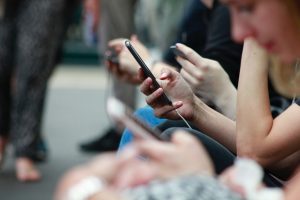 It seems like recovery stories (and eating disorder media coverage generally) can fall into a few different camps. Some show alarming graphics and use scare tactics as a means of frightening their readers into considering recovery, or simply for shock value. Some focus on only the food aspect. Some show only positive sides of recovery, not painting a true view of what is going on behind their words or images. Some provide useful information for those struggling and share personal information of what helped the writer or creator recovery. Some are simply for self-exploration and for a therapeutic release, and there is nothing wrong with that. Some are raw, vulnerable, and realistic accounts of what it truly means to have an eating disorder and what recovery could look like.
It seems like recovery stories (and eating disorder media coverage generally) can fall into a few different camps. Some show alarming graphics and use scare tactics as a means of frightening their readers into considering recovery, or simply for shock value. Some focus on only the food aspect. Some show only positive sides of recovery, not painting a true view of what is going on behind their words or images. Some provide useful information for those struggling and share personal information of what helped the writer or creator recovery. Some are simply for self-exploration and for a therapeutic release, and there is nothing wrong with that. Some are raw, vulnerable, and realistic accounts of what it truly means to have an eating disorder and what recovery could look like.
However, we are then brought to a problem that is not often openly acknowledged within eating disorder recovery, perhaps because it is uncomfortable. Resoundingly, it appears one demographic is more heavily represented than the rest: the young, White, heterosexual, cisgender woman, who usually comes from a fairly wealthy background. For the past month, I have been gathering information of the impact of pro-recovery Instagram accounts on their viewers’ attitudes towards recovery, and the academic literature has repeatedly demonstrated that non-dominant groups suffer a lack of representation within eating disorder recovery, which can lead to a multitude of problems, including an increase of experienced loneliness and further barriers to seeking treatment. Andrea Lamarre, with her incredibly interesting research, sheds light into the issue:
While we know that eating disorders don’t discriminate and can affect every single population, this prominent featuring of young White woman through eating disorder recovery can do a huge disservice to those who do not identify with this image. Although I am a member of this demographic, most of the people I’ve connected with who have recovered from or struggle with eating disorders do not fit this identity. That makes me wonder, are recovery stories where heterosexual White women are overwhelming represented helpful for those who do not resonate with this image?
Recovery is such a unique process, and universally I think everyone just wants to be at peace with themselves, but this shows up differently for everyone and how this is achieved can vary so greatly depending on culture, background, and identity.
 Recovery is such a unique process, and universally I think everyone just wants to be at peace with themselves, but this shows up differently for everyone and how this is achieved can vary so greatly depending on culture, background, and identity. Some recovering from eating disorders may have to deal with additional adversity that is not addressed in many recovery mediums, such as inability to access treatment due to finances, dealing with different cultural rituals surrounding food, potentially not having family support because they are a member of the LGBTQ community, or not being admissible to some treatment programs because they are outside of the age range of admittance.
Recovery is such a unique process, and universally I think everyone just wants to be at peace with themselves, but this shows up differently for everyone and how this is achieved can vary so greatly depending on culture, background, and identity. Some recovering from eating disorders may have to deal with additional adversity that is not addressed in many recovery mediums, such as inability to access treatment due to finances, dealing with different cultural rituals surrounding food, potentially not having family support because they are a member of the LGBTQ community, or not being admissible to some treatment programs because they are outside of the age range of admittance.
As a young, White woman myself, I can never fully grasp what it would be like to not have myself represented in the media, let alone within eating disorder recovery. The closest I can come is to remember how alone I felt within my eating disorder, desperate to connect with others who felt similar to me. I do recall reading books of recovery and seeing eating disorders represented in movies and television shows, and they were all people who looked and acted like me (well, maybe not exactly, but in terms of sharing a similar demographic, yes!). Wouldn’t that feeling of loneliness be even worse if you couldn’t find yourself represented within recovery?
Even if reading recovery stories or viewing recovery content may not be suitable for everyone, why isn’t a realistic picture painted of those who suffer from eating disorders? I imagine it would not be easy for someone who fits this very narrow picture of an eating disorder to put themselves out there, without having much other representation.
But what does this mean exactly? We can’t control the content that gets put out there, nor is anyone owed your story. I am not in a position of making recommendations on behalf of others or telling people what to do, since eating disorder recovery is a customized journey which should utilize and hone in on what is unique to you, harnessing your own strengths. Even writing this, I wonder what gives me the right to speak up about this issue or if I even should, as I am in a position of privilege in this arena because I am so widely represented. How could I relate? Well, I can look critically at how my demographic may contribute to the problem, whether it be intentional or not. I do think we can talk to each other more and critically evaluate the messages we are receiving from the media and within recovery stories about what recovery looks like, and who recovers. We can put the issue out in the open. We can be allies with others who suffer from unequal representation, having an open mind and being willing to learn from everyone.

Carolyn is currently completing graduate school, and working towards becoming a certified counsellor specializing in women’s mental health issues. In her spare time, she loves cuddling with her cat, reading, writing, and the outdoors.
By Des Washington
cold called
hearing your name
and lifted spirit
like fairy blessings
such moments we gamble at distances
and feel a little warmed
when a little near
and beneath surfaces
if you could see who you are
the stars would follow and space the chance
As a poem transfers from just a few lines or a concept into a full collection of letters and spaces, something happens. I wrote 'Days Below Zero', because I have a hard time understanding how to support someone who has a problem with themselves at the level someone struggling with an eating disorder would. I was trying to show how a peer support volunteer could engage someone, and hopefully challenge the perspective that is causing pain. I used my own struggles with depression and rejection as a springboard to try and get closer to what someone might be feeling. I'm not sure of the results, honestly, but I feel it captures a compassionate response to a serious issue, and I think that's probably good enough. I'm really happy about volunteering with the Looking Glass Foundation, and learning more about this complicated issue.

Des is an Oshawa based artist. She enjoys existential philosophy and psychology. In my spare time she creates visual/audial/literary art. She currently work in the customer service industry, but is moving into freelance writing. She also studies psychology. She hopes you enjoy her poetry as she puts a lot into it.
By Alyson Hoy

Each year, February 1st feels like the start of the new year for me. That’s because in Canada, where I live, this date marks the beginning of Eating Disorders Awareness Week (EDAW). A national week of action focused on educating the public about eating disorders, February 1st through 7th is a time to spread awareness regarding the impact of eating disorders, address stereotypes and myths about them, and share information about the resources available for people living with or affected by eating disorders. For me personally, it is also a time to pause and reflect on how far I’ve come in the last year in my eating disorder recovery and to set my intention for the coming year as I move toward my goal of being as well as I can possibly be in both mind and body.
Something I know to be true about eating disorders, and that I’ve learned, particularly as I’ve faced my own challenges in recovery over the years, is that healing is not linear. Setbacks happen, and sometimes they do so unexpectedly. For example, we may be doing really well and making great progress for a period of time when, suddenly, we find ourselves slipping up or even approaching a relapse. This happened to me about five years ago, as I was starting to inch my way out of the deep, dark hole of anorexia. I was no longer restricting; I was on my way to being weight restored; I was letting go of behaviours, and I was beginning to experiment with intuitive eating. As I loosened my regimen and rules surrounding food, however, I began to slip back – almost without noticing – into a pattern of over-exercising. Inexplicably, I found myself, once again, at the gym most days of the week, pushing myself to unhealthy limits. Although a despairing time for me, this setback was critical because it taught me that relapses can and do happen and that when they do it doesn’t mean that we have failed. It also taught me that recovery is something we must continually work for and not take for granted. With these lessons in mind I resolved to intentionally carve out regular intervals of time for myself within which to renew my commitment to recovery and to set new goals going forward.
 This year, EDAW feels particularly significant, as it coincides with a major recent change in my life. At the close of 2018 I made the decision to leave my job after nearly ten years. For a long time, I was unhappy and unwell at work. Immersed in a toxic and unhealthy workplace environment, I suffered both physically and mentally. My anxiety reached unprecedented levels, and I was not sleeping or eating well. To make matters worse, I started to worry that all the hard work I’d done in my ED recovery was coming undone from the stress. I finally decided to resign after I was bullied by a senior manager and my employer was unwilling to address the behaviour and support me. Moving into 2019, then, I’ve been adjusting to a new quiet and calm in my life. I am no longer getting up at 5:00am and leaving my house by 6:15am. I am no longer hopping on a bus and then a sky train and a sky train and then a bus for a three hour commute every day. I am no longer feeling worn down and frazzled at the end of each day. Instead, I am back to doing the one thing I have always loved to do: I am writing again. As time passes, my anxiety is lessening and I can feel myself becoming more grounded.
This year, EDAW feels particularly significant, as it coincides with a major recent change in my life. At the close of 2018 I made the decision to leave my job after nearly ten years. For a long time, I was unhappy and unwell at work. Immersed in a toxic and unhealthy workplace environment, I suffered both physically and mentally. My anxiety reached unprecedented levels, and I was not sleeping or eating well. To make matters worse, I started to worry that all the hard work I’d done in my ED recovery was coming undone from the stress. I finally decided to resign after I was bullied by a senior manager and my employer was unwilling to address the behaviour and support me. Moving into 2019, then, I’ve been adjusting to a new quiet and calm in my life. I am no longer getting up at 5:00am and leaving my house by 6:15am. I am no longer hopping on a bus and then a sky train and a sky train and then a bus for a three hour commute every day. I am no longer feeling worn down and frazzled at the end of each day. Instead, I am back to doing the one thing I have always loved to do: I am writing again. As time passes, my anxiety is lessening and I can feel myself becoming more grounded.
Slowing down my pace of life and shifting my focus back to something I am passionate about isn’t without its challenges, however. Writing is a solitary endeavour, and, as such, one issue I am facing as I move on from my regular job is a lost sense of daily social connection. At work, for better or worse, I was surrounded by colleagues; there was always someone to talk to and social events were frequent. Working from home is a different story, as most days it is just me keeping company with my cat.
As many of us know, eating disorders thrive in isolation. Thus, one step I am taking to support my recovery in 2019 is taking the initiative (and stepping outside my comfort zone) to make new connections. A few weeks ago, I started taking an American Sign Language (ASL) class. As a kid, I loved learning sign language and with practice I even became somewhat fluent in it. Now, my circumstances are such that not only do I have the time, energy, and financial capability to pursue it again, but also, I have a strong curiosity and desire – particularly as someone who completed a PhD in Education – to engage in and reflect on the unique context and learning relations that ASL affords and fosters.
As I am finding out, an ASL class involves more than learning sign language and is actually quite useful in the way that it challenges and provides a means of working through the perfectionism and rigidity that typically characterize disordered eating behaviours. For example, because the class is taught by a Deaf person, and there are both Hard of Hearing and Deaf students in the class, the classroom is a designated “voice off” zone where we are not allowed to use our voices, but rather are encouraged to express ourselves and communicate in unfamiliar non-verbal ways, often through what feels like “silly” gestures. As new learners, our ability to communicate with one another such that we can facilitate a class at all, hinges on our willingness to take chances, to make mistakes, to risk being embarrassed or misunderstood, and to trust in one another. There is no room for perfectionism or hanging back in this context. If we want to be “heard” we have no other choice but to jump in and simply try! As a lifelong perfectionist, this kind of learning through risking the self definitely feels scary at times. Yet, with each passing week, I am gaining more confidence both in my ability to sign and in my willingness to trust myself and others, knowing that any mistakes we make will be met with grace (and usually with a lot of humour too!)
Another way that ASL class is helping me in my recovery is by forcing me to be present and fully in the moment. Contrary to common understanding, ASL is a complex language completely separate and distinct from English. To learn it requires careful concentration and attunement. It is not a matter of simply transposing English into hand signs, for ASL has its own rules for pronunciation, word order, and complex grammar. In a “voice off” classroom scenario students must pay careful attention to facial expression and body cues in order to know, for example, that raised eyebrows, widened eyes, and a forward-tilting body indicate a question is being asked. In addition, to not be able to hear someone’s voice while they are attempting to communicate something to you encourages you to be present with them in a different and, even, heightened and more intimate way: You learn the shape of their mouth and eyes; how emotions resonate for them; what their energy feels like. You learn a lot from someone when you share a space of silence. As I’ve been discovering, intrusive ED thoughts are just not possible when you are present with another person in this way.
Each year, Eating Disorders Awareness Week is an opportunity for the public to learn about the issues and challenges affecting millions of Canadians. This year, the theme “Eating Disorders Can’t Afford to Wait!” focuses attention on the limited resources available for support and creates an opportunity for dialogue and discussion regarding the need for further research and for providing better treatment options and enhanced training. Although an education and awareness campaign focused on the public, EDAW is actually a really great time for those of us who are struggling and in recovery to further our own learning as well. As I have discovered, learning about eating disorders does not stop simply because one is getting better or recovered. In order to truly be well from eating disorders we need to continue to educate and challenge ourselves, to learn and try new things, and to sometimes risk what feels comforting and familiar as a necessary step to break free from those deeply inscribed patterns of behaviour that just don’t serve us anymore.
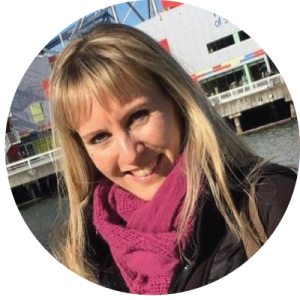
Alyson holds a PhD in Curriculum and Instruction from the University of British Columbia, an M.A. in Women’s Studies from York University, and a B.A. (Hons.) in Women’s Studies from Western University. Working at the intersection of memoir writing and queer and feminist theories of feeling and embodiment, her scholarship weaves the poetic and the autobiographical to explore themes of intimacy, emergent queer identities, sex and sexuality, trauma, eating disorders, and self-harm. Her current project is a book manuscript of my doctoral dissertation on trauma and queer memoir. Her most recent publication is a chapter entitled “Haunted by Real Life: Art, Fashion, and the Hungering Body,” in Canadian Curriculum Studies: A Metissage of Inspiration / Imagination / Interconnection (Canadian Scholars, 2018). Beyond academia, I am a writer and advocate for eating disorders awareness and prevention. I write to explore the ways in which identity and illness are implicated in each other and to consider how art-making can be a means for healing.
By Kaela Scott
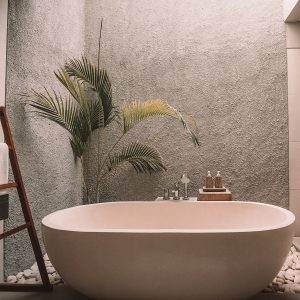 Q: It feels like everywhere I turn I keep getting told that in order to recover I have to learn Self-Care. If I am being honest, I just don’t really get what a bath has to do with me getting well, nor does it feel that helpful in the moment.
Q: It feels like everywhere I turn I keep getting told that in order to recover I have to learn Self-Care. If I am being honest, I just don’t really get what a bath has to do with me getting well, nor does it feel that helpful in the moment.
A: Oh my goodness can I ever appreciate what you are saying. Self-care is a really popular term right now in the wellness world and it feels like everywhere we turn we keep getting told that it’s the solution to most things. In reality, I stand behind self-care being a critical part of recovery. Not because a bath (or any other form of self-care) is the answer to your struggles, rather because learning to engage in a respectful and kind way towards yourself is what turns your relationship with yourself from destructive to healthy.
When someone struggles with an eating disorder, they are basically living with an abuser inside of their head. Given the nature of these disorders, individuals develop a really neglectful relationship with themselves. Hunger and fullness cues get denied, they often push their bodies to unhealthy limits, and that voice in their head is extremely cruel and judgmental. Naturally, we can’t keep treating ourselves this way and learn to have a loving relationship with ourselves. Essentially, I have never met anyone who has hated themselves into wellness.
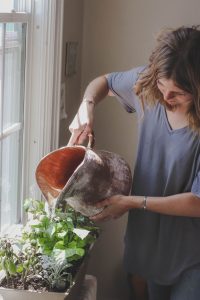 So what role does self-care play? Self-care is learning to engage with yourself differently. Some of those things will be simply about doing something fun/nice/relaxing like taking a bath, listening to music, or connecting with a friend. Other times it’s about doing what you know you need to do to feel and be well. For example, saying no to things that don’t work for you, taking the time to meal plan and prep, and intentionally scheduling downtime into your week. At some point in our recovery we have to commit to doing things differently, to going against our eating disorder’s wishes. Self-care is a component of this and, arguably, a requirement to wellness. So the next time you hear take a bath, try to not hear the bath as the solution to your recovery. Instead, hear the bath as an example of you committing to having a healthier, more compassionate relationship with yourself.
So what role does self-care play? Self-care is learning to engage with yourself differently. Some of those things will be simply about doing something fun/nice/relaxing like taking a bath, listening to music, or connecting with a friend. Other times it’s about doing what you know you need to do to feel and be well. For example, saying no to things that don’t work for you, taking the time to meal plan and prep, and intentionally scheduling downtime into your week. At some point in our recovery we have to commit to doing things differently, to going against our eating disorder’s wishes. Self-care is a component of this and, arguably, a requirement to wellness. So the next time you hear take a bath, try to not hear the bath as the solution to your recovery. Instead, hear the bath as an example of you committing to having a healthier, more compassionate relationship with yourself.
 Kaela Scott is a Registered Clinical Counsellor who specializes in Eating Disorders. She runs her own private practice and works with the Looking Glass Foundation in both their summer camp and their Hand In Hand Program. She has been passionate about working with eating disorders since freeing herself from her own struggle and realizing what it is like to be happy and well. When she isn’t working, you can find Kaela either cozying up with a cup of tea and her friends or up in the mountains going for a hike.
Kaela Scott is a Registered Clinical Counsellor who specializes in Eating Disorders. She runs her own private practice and works with the Looking Glass Foundation in both their summer camp and their Hand In Hand Program. She has been passionate about working with eating disorders since freeing herself from her own struggle and realizing what it is like to be happy and well. When she isn’t working, you can find Kaela either cozying up with a cup of tea and her friends or up in the mountains going for a hike.
By Paige Freeborn
All of those pains and resentments,
let them fall softly to the ground.
Swaying, tipping, turning like autumn leaves,
cradling their way down to the earth.
Take delight in each one,
and care for it on its journey of release,
for each one has held you steadfast on your journey.
Let these leaves of pain and resentment
rest on the earth and watch
as they magically transform into rich soil.
This is the fertile ground upon which you will grow,
rich in wisdom and confidence and beauty.
See these leaves as your growth,
each one a great teacher,
their message a part of the richness of your being.
Know that you have transformed them
into something of great value.

Throughout my eating disorder, I struggled with a pervasive sense of toxic shame: the shame that propelled the disorder in the first place; the shame of being “too weak” to stop the actions and behaviors; and the shame of not being able to speak truthfully about my mental health issues with others. The cycle of shame felt endless - a force so overwhelming that I felt powerless over it. Engaging in the eating disordered behaviours brought about temporary relief, as my body numbed to the pain I felt deep down inside. The eating disorder gave my life a focus, and the false sense that I was in control. Of course, the reality was that I was completely spiraling out of control. Self-hatred became debilitating as the eating disorder wore on, and healing became a radical act of compassion that started with forgiveness. I needed to learn to forgive myself, forgive others, and have compassion for every part of my experience, for it is only when we lovingly embrace our own suffering that we can stop the endless cycle of self-hatred and shame. Bringing to light my deepest fears, and learning to love all of the feelings and thoughts that were the manifestations of those fears, were the ingredients for my healing.
A deep pain underlies all mental illnesses and addictions and they are never, at their core, about the surface behaviours. Eating disordered people suffer with a never-ending cycle of restlessness, anxiety, and shame, and we turn to our disorder to help bring about some measure of relief. As our illness wears on, we feel less resilient, and it takes less time for us to reach the point where we engage in destructive behaviours. As we lose resilience, our bodies and minds move further away from optimum health, and our tolerance for our own suffering - and the suffering of others - diminishes. Living with an eating disorder can become a whirling vortex of despair.
After the eating disordered behaviors had ceased, I was left with a persistent sense of restlessness and anxiety in my body, and I knew I needed to explore what had been buried underneath the surface of my eating disorder. I was very disconnected from my body, and I became curious about how I could learn to inhabit it in a different way. The constant tension was unbearable, and with my usual escape mechanism (the eating disorder) no longer at play, I had to explore other options.
I started practicing meditation and yoga, and through these contemplative practices, I developed a greater capacity to sit with discomfort. With mindfulness training, we learn to sit quietly with every sensation, feeling, thought, and emotion as they arise. We learn through experience that all sensations, feelings, thoughts, and emotions inevitably pass away, no matter how intense they seem at first. Deeper into my meditation and yoga teacher training, I developed the capacity to be able to trace which bodily sensations would trigger toxic thinking. This was a fascinating exploration, and when I could witness this with non-judgemental awareness, I noticed that even the most deeply fearful and terrified states would arise, climax, and fall away all on their own if I didn’t become reactive. As I learned to come home to my body, I started befriending it, becoming curious about it, becoming in awe of it, and eventually loving it. As I learned to ride the waves of discomfort, I learned to soften into every hard edge. As I learned to relax, I became more interested in what I was experiencing, and I became more tender towards my feelings.
After years of self-compassion practice, I realized that my response to my own suffering was becoming one of kindness.
The ability to soften into my body gave me the capacity to sit with more intense forms of suffering. Eventually, I was able to sit for long stretches of time, even when I was on the verge of internal collapse. This doesn’t mean I didn’t grieve; sometimes I would weep in my meditation spot, or collapse on my yoga mat, overcome with sadness. Eventually, I developed the capacity to be able to sit calmly and create a loving space for myself, even through the most intense waves of suffering. I learned to feel my emotions fully, and to offer them a space of non-judgemental and compassionate awareness. Every time I fought with my thoughts and emotions, they would gain in intensity, and it was in these moments that I needed to show myself the most radical form of compassion. After years of self-compassion practice, I realized that my response to my own suffering was becoming one of kindness. I also came to recognize the courage it had taken to wake up every day and face the pain and exhaustion of my eating disorder.
I started developing more trust in others. It is true what they say about love: as we learn to love ourselves more deeply, we also learn to love others in a deeper way. It is only when we can sit with our own pain in a grounded way that we can also sit with the pain of others and provide them with that groundedness. Perhaps this is the greatest gift of healing: the ability to widen our circle of compassion, be comfortable with the pain of others, and understand what it means to hold space for others when they are hurting. We know how to do this because we have learned to do it for ourselves, so we are in a position to be able to offer our hard-earned wisdom to others.
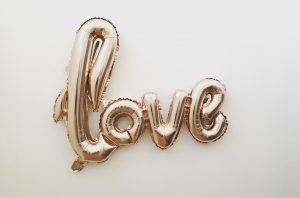 I worked with some very wise people in my recovery, who modeled what it means to create a safe, open, and loving space. I am deeply grateful to all those who supported me on my journey; they showed me what radical love and acceptance really mean. Support took many forms, including holding me as I grieved; showing patience when I tried to escape; and offering wise, timely, and constructive feedback. A powerful image comes to my mind when I remember my longtime partner sitting on the floor of our bathroom (when I was triggered and locked down in a frozen state, I would often sit on the side of our bathtub). My partner was unable to touch me or talk with me because when I was in that frozen state, my prefrontal cortex would go offline, and I couldn’t access cognition or vocabulary. I also couldn’t move or be touched. My partner would sit there for hours with me, without judging me in any way. I knew he fully loved me in those moments, and that he didn’t need me to change in any way. He also expected nothing from me in return. This open and loving acceptance was, for me, the true meaning of support.
I worked with some very wise people in my recovery, who modeled what it means to create a safe, open, and loving space. I am deeply grateful to all those who supported me on my journey; they showed me what radical love and acceptance really mean. Support took many forms, including holding me as I grieved; showing patience when I tried to escape; and offering wise, timely, and constructive feedback. A powerful image comes to my mind when I remember my longtime partner sitting on the floor of our bathroom (when I was triggered and locked down in a frozen state, I would often sit on the side of our bathtub). My partner was unable to touch me or talk with me because when I was in that frozen state, my prefrontal cortex would go offline, and I couldn’t access cognition or vocabulary. I also couldn’t move or be touched. My partner would sit there for hours with me, without judging me in any way. I knew he fully loved me in those moments, and that he didn’t need me to change in any way. He also expected nothing from me in return. This open and loving acceptance was, for me, the true meaning of support.
In order to fully heal, we must have support. Finding those who love us completely, even when we can’t love ourselves, is central to our healing. As we learn to love ourselves, we come to understand that our eating disorder was borne out of a place of deep sensitivity, and a desire to be loved. As we heal, we fall in love with every part of ourselves, even the parts we didn’t think were worthy of love. Healing means loving the dark places in ourselves, and all the parts of ourselves we didn’t think were ok. Eventually, we fall in love with every step we’ve taken along the windy road to recovery, because each of these steps has created the resilient and compassionate person we are today.
To all those suffering with an eating disorder...
May you see the dignity in your suffering.
May you realize the strength you possess, enough to bear the torture of your experience, and survive every day.
May you celebrate the courage that carries you forward into every day.
May you believe in the great rewards of recovery: more strength, deeper wisdom, and boundless compassion.
May you know that freedom and ease are possible.
May you be fully witnessed by someone who sees beyond your eating disorder and into your true, essential nature.
May you know you are already complete and whole, just as you are in this very moment.
May you let down your guard, and be truly who you are.
And may you know you are loved.
 Paige Freeborn is an artist, educator, meditation and yoga teacher, and sociocultural leader who recovered from an eating disorder over twenty years ago. She regularly works with teenagers and adults, helping them develop more self-compassion, as well as the confidence they will need to be able to be a support for others. Over the years, Paige has oriented much of her life around service. She is looking forward to becoming involved with the Looking Glass Foundation’s Hand In Hand Program.
Paige Freeborn is an artist, educator, meditation and yoga teacher, and sociocultural leader who recovered from an eating disorder over twenty years ago. She regularly works with teenagers and adults, helping them develop more self-compassion, as well as the confidence they will need to be able to be a support for others. Over the years, Paige has oriented much of her life around service. She is looking forward to becoming involved with the Looking Glass Foundation’s Hand In Hand Program.
By Kaela Scott
Q: The Holidays have just ended and now my anxiety has gone up. All of a sudden it feels like everyone is talking about going on a diet and how their New Years resolutions are to lose weight and workout a lot. A part of me feels like I need to do the same even though I know that wouldn’t be healthy for me. How should I navigate these next few weeks when everyone is obsessing over weight and exercise?
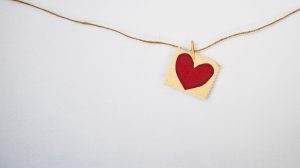
A: I have so much compassion for individuals who struggle with eating disorders at any time of the year but my heart really goes out to them at this time when it feels like the whole world is triggering. A sad reality is that the world we live in has been highly impacted and controlled by the diet and beauty industry and January 1st has been engrained in our minds that it is a day to focus on things we feel aren’t okay about us. Eating disorders thrive in this mindset and when others express similar views it is often compelling to join the ranks and push yourself harder. This is destructive and the very last thing that will set you up to recover or feel okay about who you are as a person. As the New Year fast approaches there are a few things I think are important to keep in mind as you enter into 2019:
 January 1st can be a time of healthy transition, disordered goals or it can just be another day. Either way, you get to choose. If you are someone who likes to have goals, then set the goals according to what you know will be good for you, not your eating disorder. And if you don’t, then choose to see January 1st for what it is, just another day of the week. We really get to make of it what we want. Either way, know that we are here to help you process if the transition into 2019 is a hard one.
January 1st can be a time of healthy transition, disordered goals or it can just be another day. Either way, you get to choose. If you are someone who likes to have goals, then set the goals according to what you know will be good for you, not your eating disorder. And if you don’t, then choose to see January 1st for what it is, just another day of the week. We really get to make of it what we want. Either way, know that we are here to help you process if the transition into 2019 is a hard one.
 Kaela Scott is a Registered Clinical Counsellor who specializes in Eating Disorders. She runs her own private practice and works with the Looking Glass Foundation in both their summer camp and their Hand In Hand Program. She has been passionate about working with eating disorders since freeing herself from her own struggle and realizing what it is like to be happy and well. When she isn’t working, you can find Kaela either cozying up with a cup of tea and her friends or up in the mountains going for a hike.
Kaela Scott is a Registered Clinical Counsellor who specializes in Eating Disorders. She runs her own private practice and works with the Looking Glass Foundation in both their summer camp and their Hand In Hand Program. She has been passionate about working with eating disorders since freeing herself from her own struggle and realizing what it is like to be happy and well. When she isn’t working, you can find Kaela either cozying up with a cup of tea and her friends or up in the mountains going for a hike.
By Kaela Scott
 I must admit, I can’t quite believe that we are almost in December. Where did this year go? I always find the holiday season to be one of my favorites, but I also know it’s a time that can be really difficult for people. Not only is this season busier than we often want (even though its portrayed as a time to slow down and sip hot chocolate while walking in the snow), but it’s also really food centered, which can be really overwhelming and triggering. As the month approaches, I think there are some things that can be helpful to keep in mind. Hopefully these suggestions will make the month seem a little easier on your heart and your mind.
I must admit, I can’t quite believe that we are almost in December. Where did this year go? I always find the holiday season to be one of my favorites, but I also know it’s a time that can be really difficult for people. Not only is this season busier than we often want (even though its portrayed as a time to slow down and sip hot chocolate while walking in the snow), but it’s also really food centered, which can be really overwhelming and triggering. As the month approaches, I think there are some things that can be helpful to keep in mind. Hopefully these suggestions will make the month seem a little easier on your heart and your mind.
Drop the Expectation To Have and Be It All: This month is filled with unrealistic and unhealthy expectations around being and doing: parties to attend, outfits to buy, holiday events to go to, gifts to buy, and a positive holiday spirit to go along with it all. All of this pressure can lead to an increase in our anxiety and when we are anxious, we often turn to our eating disorder. Instead, try to focus on how you want to feel over this month. Do you want to feel connected? Grounded? Happy? Peaceful? Once you know how you want to feel, start focusing on the things you can and need to do to make that happen. With that focus, the month starts to become your own and you get to fill it with the things that will actually fill your heart up.
Have Realistic Recovery Goals: In my opinion, this is not the month to set yourself up to accomplish a bunch of recovery focused goals. For starters, it’s a month that is filled with triggers, food based and otherwise. In addition, because the month is typically emotionally and physically busy, your emotional and mental reserves are likely going to deplete more rapidly than at other times. If you are wanting to challenge yourself, set really realistic goals. For example, instead of challenging yourself to say yes to all the holiday festivities, pick the top 2 or 3 that feel the most important to you and commit to showing up and engaging in a way that would make you feel proud of yourself. The same applies to food. Don’t expect yourself to partake in every food challenge that comes your way this season. Instead, think of 1 or 2 food-based experiences that you would like to have or like to feel successful at and stick with those. If we aim higher than we can manage, the disappointment and defeat can have a significant impact on our belief that we can recover.
[dt_quote type="pullquote" layout="right" font_size="big" animation="none" size="18"]Instead of challenging yourself to say yes to all the holiday festivities, pick the top 2 or 3 that feel the most important to you and commit to showing up and engaging in a way that would make you feel proud of yourself.[/dt_quote]
Set Time Aside For Self-Care: Self-care seems to have become a bit of a buzz word lately and is leaving everyone with thoughts of bubble baths and hot cups of tea. While both of these are great, self-care is actually less about the bath and more about intentionally doing the hard work of looking after your needs. Sometimes self-care is taking a long bath, other times it is saying no to a social engagement to stay home and prep your meals for the week so you can stay on top of your recovery. Many times self-care doesn’t feel relaxing until it is done. Often, it is doing the things that can feel hard to do in the moment but that make you feel better in the long run. This month you are going to be pulled in every direction on all levels. Set some time aside at least a few times a week to do some self-care and be sure to prioritize your wellbeing over the demands of the season.
If at any point during this month you need some extra support, know that all of us at Looking Glass are here to help. Give us a call, we would love to hear how you are doing and how we can help make your holiday season a kinder, more manageable one!
[/vc_column_text][/vc_column][/vc_row][vc_row][vc_column][vc_column_text]
[/vc_column_text][/vc_column][/vc_row][vc_row][vc_column][vc_column_text]
[dt_divider style="thin" /]
 Kaela Scott is a Registered Clinical Counsellor who specializes in Eating Disorders. She runs her own private practice and works with the Looking Glass Foundation in both their summer camp and their Hand In Hand Program. She has been passionate about working with eating disorders since freeing herself from her own struggle and realizing what it is like to be happy and well. When she isn’t working, you can find Kaela either cozying up with a cup of tea and her friends or up in the mountains going for a hike.
Kaela Scott is a Registered Clinical Counsellor who specializes in Eating Disorders. She runs her own private practice and works with the Looking Glass Foundation in both their summer camp and their Hand In Hand Program. She has been passionate about working with eating disorders since freeing herself from her own struggle and realizing what it is like to be happy and well. When she isn’t working, you can find Kaela either cozying up with a cup of tea and her friends or up in the mountains going for a hike.
[/vc_column_text][/vc_column][/vc_row]